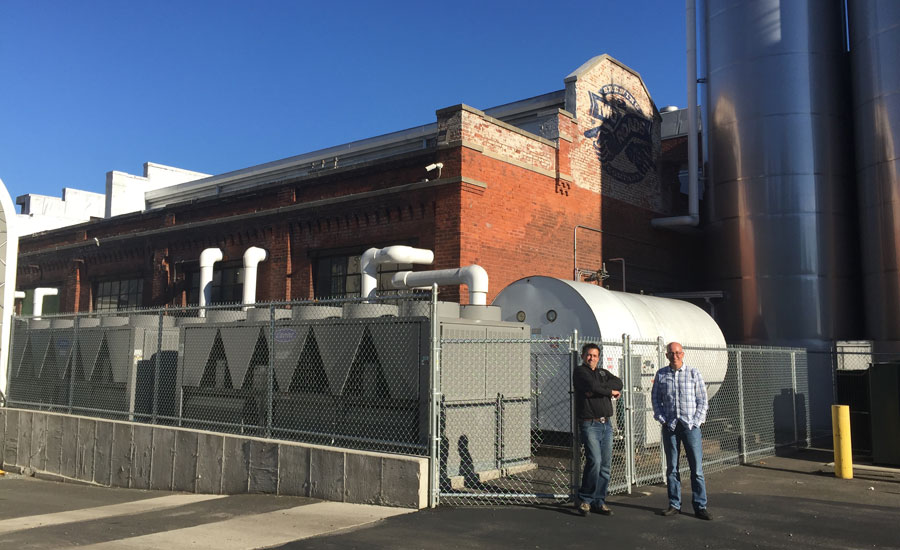NEW YORK — In late 2015, Two Roads Brewing Co. in Stratford, Connecticut, was looking to expand its fast-growing brewery and needed the expertise of an HVACR manufacturer to assist them. Phil Markowski, master brewer, and Mike Wight, director of operations, contacted a local HVAC contractor who put them in touch with Gregg Mello in the Carrier Enterprise (CE) Connecticut office. Mello leads the region's Craft Beer Cooling division and is a knowledgeable and passionate craft brewing enthusiast. Combining Two Roads' expansion needs, Mello's craft brewing expertise, and Carrier's specialized chiller equipment, CE designed a system that would exceed Two Roads' expectations.
Two Roads Brewing Co. started their brewery in 2012 with an 80 hp chiller system installed in a building built in the 1920s that was the former home of U.S. Baird Manufacturing Co., a metal-forming machinery manufacturer. With its funky, retro vibe and unique lifestyle philosophy, Two Roads became very popular right from the start and grew quickly. In late 2015, the company realized its existing operation was at capacity. It began the first of two major expansions, taking it from a 75,000 barrel a year operation to 150,000 barrels produced for both Two Roads and other small craft beer artisans by the end of 2017.
The process of heating and cooling the wort — the liquid created in the beer brewing process — is critical to the success of craft beer, and it is crucial that the chiller operates quickly and efficiently to lower the wort back to the ideal temperature. With his in-depth knowledge and passion for craft brewing, Mello worked closely with Markowski, Wight, and a local HVAC contractor to design a system that would meet the goals of integrating the brewery's existing chiller system, be easy to install with little infrastructure upgrades, and would offer the highest energy efficiency with the best return on investment (ROI). After analyzing the current system and overall operational goals, Mello turned to Carrier Corp. to find the best chiller system that would provide non-ozone depleting refrigerant, simple installation, superior energy efficiency, and powerful controls.
"It was important for the expansion to seamlessly integrate the existing chiller into the new system with minimal infrastructure upgrades. Since Carrier has such a wide line of chiller options, it was easy to find an affordable and sustainable chiller and control system and would easily plug into the existing brewing operation for both phases of expansion," said Mello.
Mello designed the system using two Carrier AquaForce air-cooled screw chillers from Carrier's most energy-efficient chiller product portfolio. The system was designed to provide 100 tons per chiller of process cooling and to work in combination with the original 80-ton chiller to provide enough chilling for an 180,000-barrel production facility. Mello selected Carrier's Model #30XA162 with direct expansion flooded coolers designed especially for low-temp operation. These units are each designed to make 27 deg, leaving 33 percent propylene glycol mix with a flow rate of 425 gallons per minute (gpm), producing 100 tons of process cooling for Two Roads brewery.
In addition, the AquaForce chillers were provided with low ambient kits for operation to -20°F ambient, wye delta starters, suction line insulation, freeze protection, isolation valves, E-coated micro channel type condenser coils, non-fused disconnects, control transformers, and the Carrier proprietary "low sound package" to ensure quiet operation and minimal disruption to the brewery tasting room. The chillers were easily integrated into the existing brewery infrastructure by utilizing a parallel arrangement to ensure that the original system could be used as a backup chiller for higher volume processing. The two Carrier units were conveniently installed outside the building on two large concrete pads housed adjacent to the existing cooling system.
Two Roads Brewing Co. is also leading the charge in the craft brewing industry with its commitment to energy efficiency and sustainability throughout its operations. For the expansion project, Mello specified an upgrade to the standard controls using BACnet communications, greatly improving the brewery’s abilities to control and view its chiller plant. The two Carrier chillers were supplied with BACnet communications, and CE retrofitted the existing chiller with a Carrier BACnet card. With the Carrier BACnet I-Vu control system and user interface, the brewery operations engineer will have the ability to view the chiller plant operation, alarms, and modify settings on the internet from anywhere in the world.
For more information, visit www.cehvac.com.
Publication date: 2/6/207
Want more HVAC industry news and information? Join The NEWS on Facebook, Twitter, and LinkedIn today!


Report Abusive Comment